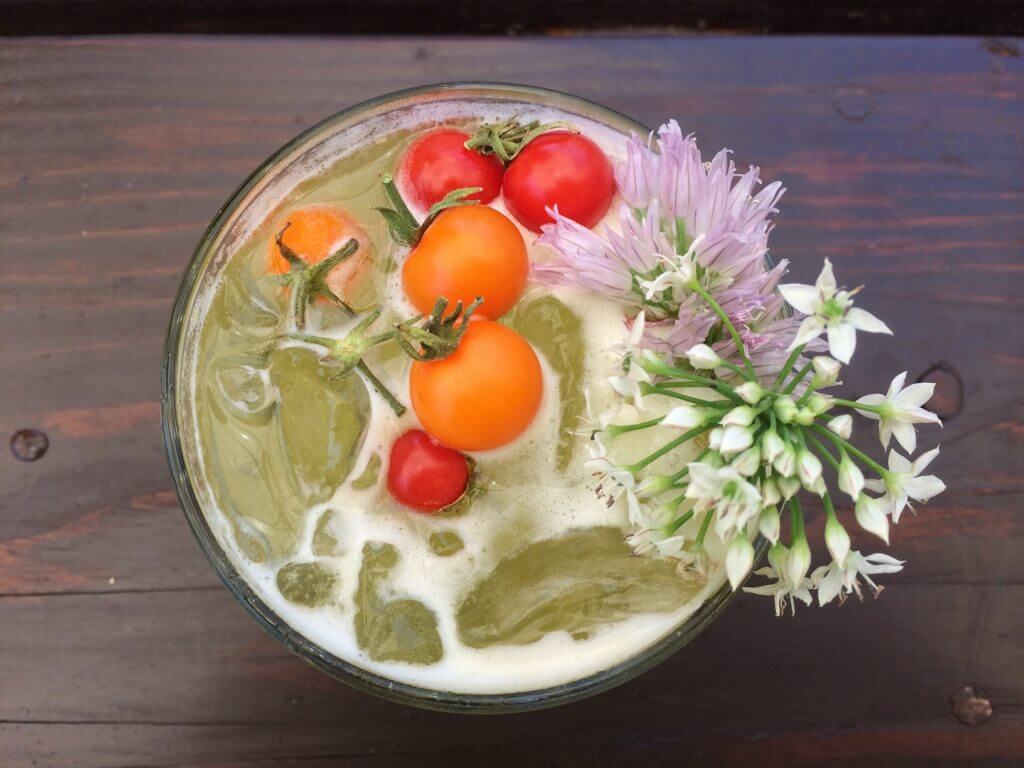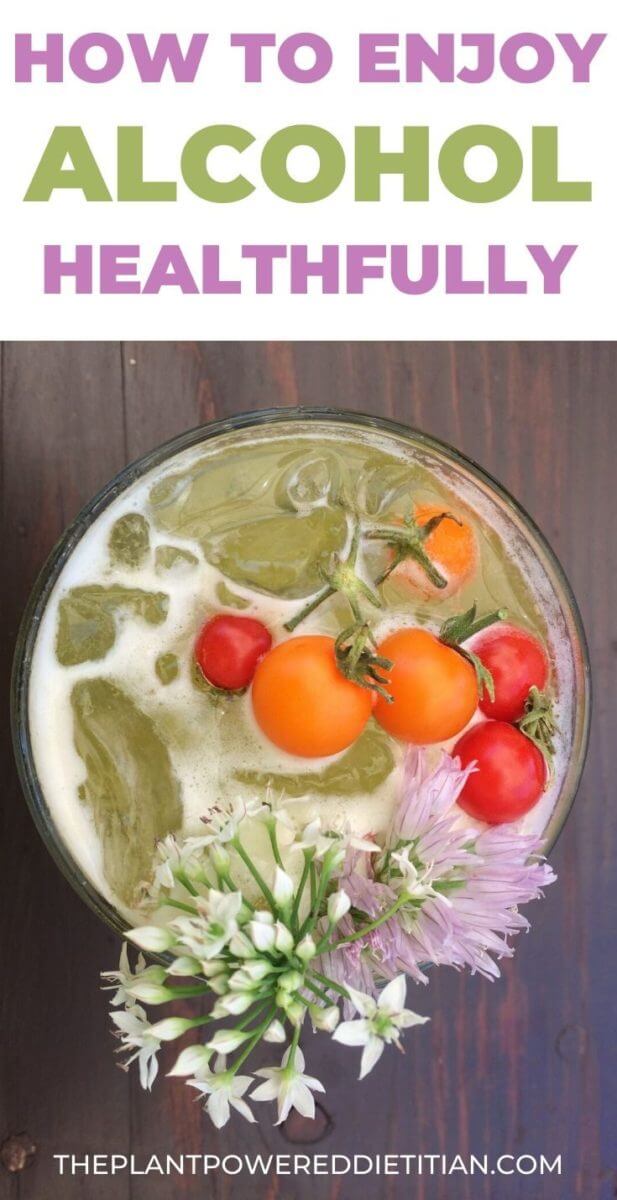How to Enjoy Alcohol Healthfully

Should you imbibe or not? Should you feel guilty about longing for a glass of wine at the end of the day? Is it ok to join in on the craft cocktail movement? These are important questions many of us have as we march along the path to a healthful diet and lifestyle. I, for one, am a wine lover. I studied wine at the Culinary Institute of America Greystone with the amazing Karen McNeil, and I love to travel around the wine regions of the world tasting vintages and understanding how the terroir and care of the wine-maker can turn simple grapes into a wine that can taste of cedar, lilacs, honeysuckle, apricots, lemons, and black pepper. While some research has linked moderate wine intake to health benefits, more recent research has linked even modest wine intake to higher risk of cancer. How do you interpret the science to make the most healthful choices? Well, that’s exactly what I asked alcohol and health expert Ginger Hultin MS, RDN, CSO of Champagne Nutrition to do for us today. Read on to learn about her top recommendations on how you can enjoy alcohol healthfully within your lifestyle. Cheers!

How to Enjoy Alcohol Healthfully
Sharon: What is the bottom line take-away message on drinking wine and health? Will moderate wine consumption help you live longer, or will it take years off your life?
Ginger: The bottom line is that, while some studies do show potential health benefits with low levels of alcohol (read: 1/2-1 glass of wine some days of the week), generally the risks outweigh the benefits, especially if you drink more than the recommended amounts. Guidelines clearly state that you should not start drinking to gain health benefits if you don’t drink already. Most people are focused on drinking less, not more, for their health.
Sharon: A lot of people turn to a glass of wine at the end of the day for a stress reliever. Is that good or bad? Why?
Ginger: A lot of people do for sure. Alcohol is a depressant, which means it slows down the brain and the central nervous system’s processes creating a relaxed feeling. It’s a bit of a band-aid because it could be covering up WHY you’re stressed at the end of the day or other stress-relieving activities, like exercise or social support. If this is the case, then it’s a risk that a person could become reliant on using alcohol for relaxation, which could even lead to addiction. It just depends on how you’re using alcohol; this is about your relationship to it and whether you have appropriate self-care strategies in place. It could be totally fine! Or it could signal a larger problem.
Sharon: What are some of the beneficial aspects of wine?
Ginger: Wine has some wonderful properties. It has cultural, religious, historical, and culinary importance. It is used in celebration and social occasions, as well as food and wine pairings. There is some available research that consuming alcohol at low levels (that 1/2-1 glass per day) can benefit the cardiovascular system by raising HDL (good) cholesterol, decreasing platelet aggregation, reducing fibrinogen levels, and providing potential anti-inflammatory benefits. There is also interesting research on light/moderate drinking and decreased risk of developing type 2 diabetes. The Finnish twin cohort study, with 11372 participants, found reduced risk of developing prostate cancer in men who drank lightly compared to those who didn’t drink at all. It’s important to note that most of the studies on alcohol and cancer show an increased risk.
Sharon: What are some of the potentially dangerous aspects of wine, even in moderation?
Ginger: The biggest direct issue is if someone has pancreas or liver disease. Alcohol may be contraindicated here. Alcohol can negatively interact with many medications so definitely assess for safety there. Also, it can cause the worsening of several GI conditions – including common problems like GERD or IBS. Finally, there is a direct link between alcohol intake and cancers of the oral cavity, esophagus and larynx, and a relationship or connection between alcohol intake and breast, colon, rectum, liver, pancreas, and prostate cancers and melanoma. Though a lot of the negative research here is on heavier drinkers, people should use caution based on family history and personal risk factors even if they’re light drinkers.
Sharon: Do you think that people are confused with “moderation” in alcohol consumption and what that means? What DOES it mean?
Ginger: Absolutely they are, because that term is subjective. Moderation for someone who drinks very little if at all vs. someone who drinks daily are very different. The guidelines are clear: To reduce the risk of alcohol-related harms, the 2015-2020 U.S. Dietary Guidelines recommends that if alcohol is consumed, it should be in moderation (1 drink/day for women or 2 drinks/day for men). This is not intended as an average over several days, but rather the amount consumed on any single day. The WHO recommends not exceeding 2 drinks per day and having at least 2 non-drinking days per week.
Sharon: What are some of the pitfalls people face with wine consumption? What are some of the confusions and misunderstandings surrounding wine and health?
Ginger: A common myth is that it’s “healthy” and more is better. I think people sometimes forget that there are calories in wine and that it does affect the body. People take the “French Paradox” and run with it, sometimes using that as an excuse to drink more. The informed drinker will consider their relationship to alcohol, how drinking wine positively and negatively affects their life, and understand the guidelines that help support health without detracting from it.
Sharon: Some people (me included) just love wine—they are in love with the romance, taste, nuance, craftsmanship. How can this be woven into a healthy lifestyle?
Ginger: Including ME! I don’t think that wine or alcohol should be discredited based on health alone. There are a lot of reasons people drink – as part of celebrations, social gatherings, for religious ceremony, in a culinary setting, or even in a variety of cultures or artistic expressions. I think that individuals need to assess their relationship with alcohol and WHY they drink. If it’s at the recommended levels and they feel it adds value to their lives, I’d argue it’s a good thing all around when used correctly. It can bring people together.
Sharon: Wine is part of the Mediterranean diet, as well as the French Paradox. How can we fit that into healthy recommendations for our everyday life? One thing I have always observed is that in these regions people hardly stop at 1-2 glasses of wine. Any comments on this?
Ginger: Absolutely. This is a concept first coined in 1992 in a study on a population in Southern France though the Framingham heart study, which was actually the first one to find a u-shaped curve between ischemic heart disease—meaning that people who drank a little bit (that 1-2 glasses) were at less risk than those who abstained completely. The recommendations here should be: don’t start drinking if you already don’t, BUT if you do drink, make sure that you stick with the recommended guidelines for alcohol intake because there could be potential benefit there. Also, consider the other factors that play a role in French living that could equate to health and longevity, including a positive relationship with food—savoring and eating as a family or community in addition to a physically active lifestyle.
Sharon: What are some bottomline recommendations for how much alcohol to include in a healthy lifestyle?
Ginger: I strongly suggest that people introduce mindfulness to their alcohol consumption. Sipping, savoring, and pairing with food can be an enjoyable way to include wine in the diet. The guidelines are clear and should be followed: To reduce the risk of alcohol-related harms, the 2015-2020 U.S. Dietary Guidelines recommends that if alcohol is consumed, it should be in moderation (1 drink/day for women + 2 drinks/ day for men). This is not intended as an average over several days, but rather the amount consumed on any single day. The WHO indicates not exceeding 2 drinks per day and having at least 2 non-drinking days per week.
Ginger Hultin is a life-long vegetarian and advocate for a plant-based lifestyle for all. She is a certified board specialist in oncology nutrition and holds a Bachelor’s degree in English and Master’s degree in nutrition. She currently works at the scientific wellness company Arivale in Seattle as a registered dietitian coach optimizing wellness through nutrigenomics. Ginger also serves as adjunct clinical faculty at Bastyr University in the teaching clinic, where students see patients in a practicum-style environment. She serves as national spokesperson for the Academy of Nutrition and Dietetics, past chair of Vegetarian Nutrition dietetic practice group, and past President of the Chicago Academy. Follow along with Ginger on Facebook, Twitter, Instagram, and Pinterest.
For other lighter cocktail recipes check out some of my favorites:
Cucumber Herb Champagne Sparkler
Winter Pomegranate Ginger Sparkler
Light Aperol Spritz



